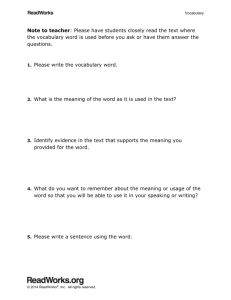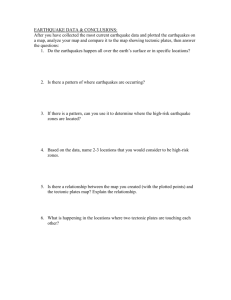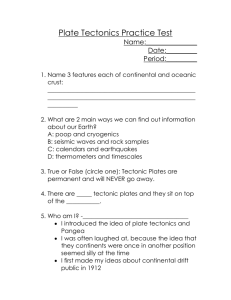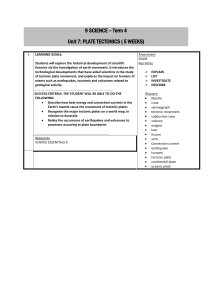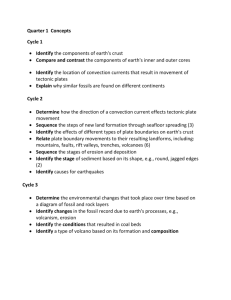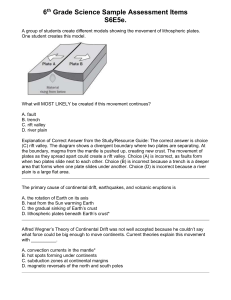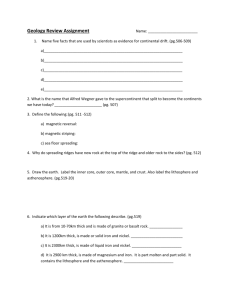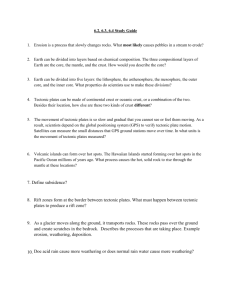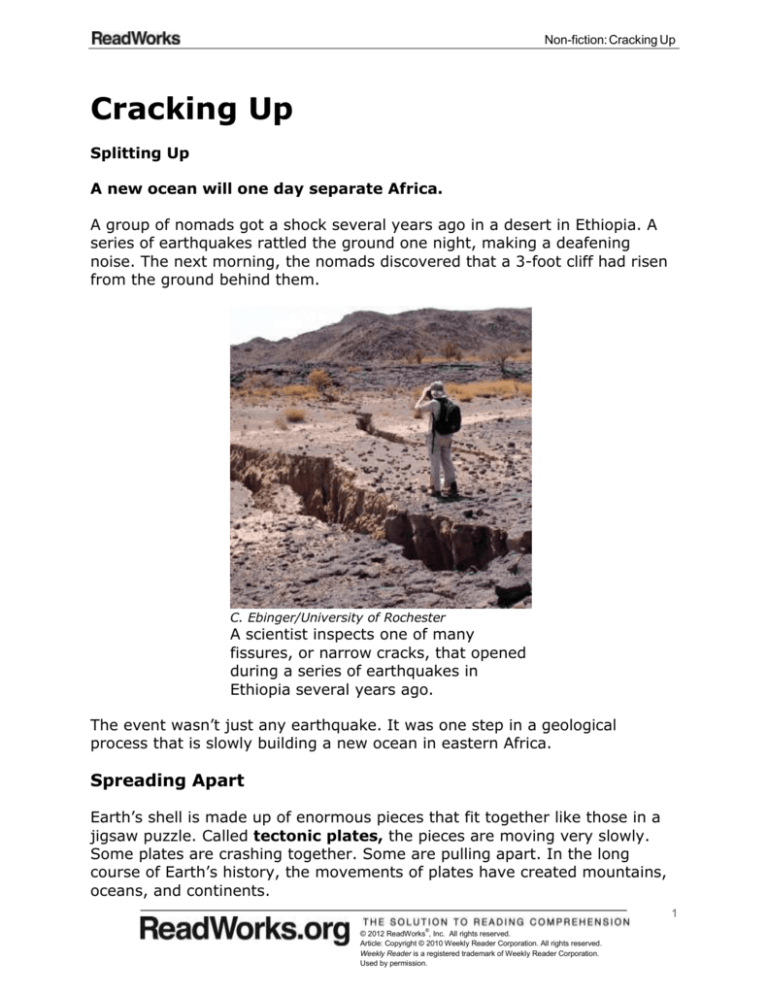
Non-fiction: Cracking Up
Cracking Up
Splitting Up
A new ocean will one day separate Africa.
A group of nomads got a shock several years ago in a desert in Ethiopia. A
series of earthquakes rattled the ground one night, making a deafening
noise. The next morning, the nomads discovered that a 3-foot cliff had risen
from the ground behind them.
C. Ebinger/University of Rochester
A scientist inspects one of many
fissures, or narrow cracks, that opened
during a series of earthquakes in
Ethiopia several years ago.
The event wasn’t just any earthquake. It was one step in a geological
process that is slowly building a new ocean in eastern Africa.
Spreading Apart
Earth’s shell is made up of enormous pieces that fit together like those in a
jigsaw puzzle. Called tectonic plates, the pieces are moving very slowly.
Some plates are crashing together. Some are pulling apart. In the long
course of Earth’s history, the movements of plates have created mountains,
oceans, and continents.
1
®
© 2012 ReadWorks , Inc. All rights reserved.
Article: Copyright © 2010 Weekly Reader Corporation. All rights reserved.
Weekly Reader is a registered trademark of Weekly Reader Corporation.
Used by permission.
Non-fiction: Cracking Up
In eastern Africa, two large tectonic plates—the African Plate and the
Arabian Plate—are pulling away from each other. “There’s true plate
spreading going on there,” Cindy Ebinger, an earth scientist at the University
of Rochester in New York, told ScienceSpin.
That’s not all. As the two plates pull apart, the African Plate is splitting into
two pieces. One tectonic plate is becoming two plates.
Joe Lemonnier
An ocean will one day fill
the Great Rift Valley, where
Africa is pulling apart.
Recently, that tectonic activity has gotten dramatic. In 2005, the cracking of
the African Plate triggered a volcanic eruption in Ethiopia. That was followed
by a series of earthquakes—the same ones the nomads felt. The
earthquakes occurred as magma (liquid rock) rose from deep within Earth,
splitting the ground wide open. A series of crevices, some as wide as 10
feet, opened along a 35-mile stretch of desert in Ethiopia. Since then, the
cracks have continued to grow.
A Natural Lab
Africa’s tectonic activity has been going on for 30 million years. The
spreading and cracking is what formed the Red Sea, as well as a deep
depression known as the Great Rift Valley. The rift runs south from the
bottom of the Red Sea through eastern Africa.
As the two sides of the rift valley pull even farther apart, the entire area will
someday fall below sea level. Eventually, water from the Red Sea will rush in
to fill the rift, spawning a new body of water. A million years from now—
possibly sooner—the Great Rift Valley will lie at the bottom of an ocean that
divides Africa in two.
2
®
© 2012 ReadWorks , Inc. All rights reserved.
Article: Copyright © 2010 Weekly Reader Corporation. All rights reserved.
Weekly Reader is a registered trademark of Weekly Reader Corporation.
Used by permission.
Questions: Cracking Up
Name:
Date:
1. Based on the passage, which of the following is NOT created by tectonic plate
movement?
A
B
C
D
countries
oceans
mountains
continents
2. Based on the sequence of the geological process described in the passage, when will
the Great Rift Valley fill with water?
A
B
C
D
never
after the area is flooded by rain
after the area falls below sea level
after 30 million years
3. Based on the passage, how often are new oceans created?
A
B
C
D
not often, because it takes millions of years
very often, because tectonic plates move fast
every year
whenever an earthquake happens
4. Read the following sentence: “A series of crevices, some as wide as 10 feet, opened
along a 35-mile stretch of desert in Ethiopia.”
As used in the sentence, what are crevices?
A
B
C
D
open spaces in the desert
large cracks in the ground
shaking during earthquakes
liquid magma from volcanic eruptions
5. This passage is mainly about
A
B
C
D
how tectonic plates move under the ocean
continents and how they are created
how nomads live in Ethiopia
tectonic plates creating a new African ocean
1
© 2012 ReadWorks®, Inc. All rights reserved.
Questions: Cracking Up
6. According to the passage, what are two ways tectonic plates move?
_
_
7. Based on the passage, why don’t we usually feel it when tectonic plates are crashing
together and pulling apart?
8. The question below is an incomplete sentence. Choose the word that best completes
the sentence.
One day the Great Rift Valley will become an ocean,
level.
A
B
C
D
it falls below sea
before
although
finally
after
9. Answer the questions based on the sentence below.
In 2005, a volcanic eruption triggered a series of earthquakes in Ethiopia.
What? a volcanic eruption
(did) What?
When?
Where?
2
© 2012 ReadWorks®, Inc. All rights reserved.
Questions: Cracking Up
10. Read the vocabulary word and definition below and complete questions 10a, 10b,
and 11.
Vocabulary Word: trigger (trig·ger): to cause something to begin or to happen.
10a. Read the five sentences below and underline the word trigger in each sentence.
The movement of the tectonic plates triggered an earthquake when they pulled
the ground apart.
1.
The stronger safety laws triggered a growth of the town’s economy as more
people felt confident enough to build new businesses.
2.
The other person’s mean words triggered Sue’s tears because they made her
feel sad.
3.
Knocking one book off of the shelf triggered a chain reaction that knocked down
all of the books.
4.
Being outside during the spring triggered her sneezing, because she was allergic
to flowers.
5.
10b. Which image shows an event triggered by some change?
11. What might trigger the fire department to hurry to an apartment building?
3
© 2012 ReadWorks®, Inc. All rights reserved.
Teacher Guide & Answers: Cracking Up
4
© 2012 ReadWorks®, Inc. All rights reserved.

